
And the time will come when you see
we’re all one, and life flows on
within you and without you.

And the time will come when you see
we’re all one, and life flows on
within you and without you.
 It seems we Americans are caught up in and even obsessed with dualities. Good and evil, god or no god, democracy or tyranny, Democrat or Republican, liberal or conservative, men are from Mars and women from Venus. It all makes for a compelling competitive narrative and a great show when our team, however that’s defined by a group of us, goes up against the opposition, particularly when our team wins. I even tend to think in the duality of patriarchy versus partnership, and frame my own narrative of the latter (the circle of equals) triumphing over the former (hierarchies of domination and control).
It seems we Americans are caught up in and even obsessed with dualities. Good and evil, god or no god, democracy or tyranny, Democrat or Republican, liberal or conservative, men are from Mars and women from Venus. It all makes for a compelling competitive narrative and a great show when our team, however that’s defined by a group of us, goes up against the opposition, particularly when our team wins. I even tend to think in the duality of patriarchy versus partnership, and frame my own narrative of the latter (the circle of equals) triumphing over the former (hierarchies of domination and control).
But more and more these days I’m thinking this is an overly simplistic and unsophisticated approach to the world, that maybe sells tickets to some sort of framed contest between two opposing sides, but does not serve the cause of coming to some sort of compromise consensus on a pragmatic path forward for our society. What is needed I think is a different metaphor for constructive conflict that allows for an array of constituencies to form ever-changing relationships with each other.
 They teach you that when in a job interview if asked whether you have a particular skill or experience and you must honestly say no, it is best to say “no but…” followed by sharing some other skill or experience you do or have had that is arguably comparable or at least applicable. For example, “No, I don’t have experience as a manager, but I do have a great deal of experience chairing committees in my congregation and leading volunteers.”
They teach you that when in a job interview if asked whether you have a particular skill or experience and you must honestly say no, it is best to say “no but…” followed by sharing some other skill or experience you do or have had that is arguably comparable or at least applicable. For example, “No, I don’t have experience as a manager, but I do have a great deal of experience chairing committees in my congregation and leading volunteers.”
I think that rule of thumb is applicable for any advocacy, even beyond advocating for one’s own employment. So when asked, “Do you believe in God?”, nowadays I am inclined to say “No, but…I appreciate the idea that there is a deeper level of connection between all of us and have my own metaphor for that connection.”
If the person asking believed in God they might not buy my answer. There take may be that either you believe there is a deity or you don’t (or maybe you’re not sure). Isn’t this an unbridgeable chasm between the worldviews of the atheist and the “believer” (theist)? How can there be any common ground here?
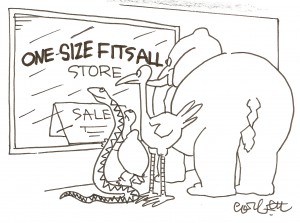 On Thursday I read an Education Week blog piece, “Survey Finds Rising Job Frustration Among Principals”, highlighting the Metlife Survey of American Teachers documenting declining morale among both teachers, principals, and other school leaders. It rekindled my frustration with the mainstream approach to endless inside-the-box “reform” of our public education system rather than making some real substantive changes. I posted perhaps an overly provocative comment…
On Thursday I read an Education Week blog piece, “Survey Finds Rising Job Frustration Among Principals”, highlighting the Metlife Survey of American Teachers documenting declining morale among both teachers, principals, and other school leaders. It rekindled my frustration with the mainstream approach to endless inside-the-box “reform” of our public education system rather than making some real substantive changes. I posted perhaps an overly provocative comment…
Seems like all the participants in the conventional schooling process are hating it more and more! Will we have to let the whole thing go down in flames before we get out of our state of denial and really transform the system, rather than this endless reform?
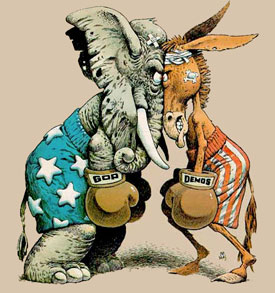 My “ministry” is all about celebrating and championing human development at an individual and societal level. A key thread in that development (at both the individual and societal level) is our society’s transition from hierarchies of control towards circles of equals. So in that regard, what light (if any) does the recent election shed on our path forward?
My “ministry” is all about celebrating and championing human development at an individual and societal level. A key thread in that development (at both the individual and societal level) is our society’s transition from hierarchies of control towards circles of equals. So in that regard, what light (if any) does the recent election shed on our path forward?
I’m a lover of lists, and here is my list of the areas of this transition that continue to be of most interest to me…
1. The engagement between youth and adults – With women emerging more and more as partners to men around the world, young people remain the world’s last human “chattel”, often beyond the reach of full human rights even in a democratic country like the U.S. At issue is the liberation of this group of people, that many still diminish as mere “children”.
2. Human development – While more and more we acknowledge this as a lifelong process, we still generally constrain that development, particularly among our young people, by prescribing and proscribing what they can learn in school, while minimizing the possibility for informal self-directed learning outside of a formal teacher-led classroom.
3. The engagement between men and women – The most profound divide between people that bifurcates every societal institution from the intimate family to macroeconomics, and plays out with the related issue of sexual orientation, all still juiced with masculine/feminine mythology.
4. The engagement between white people and people of color – Our greatest source still of “us and them” thinking based on a siege mentality still prevalent among many people. Acknowledging that racial privilege still exists while trying to move to a more egalitarian society is a continuing difficult challenge.
5. The levels of governance – The degrees of separation between the decision-makers and the people impacted by those decisions. The truest quantifiable indicator of the overall transition from hierarchies of control to a circle of equals. Also the degree of “one dollar one vote” plutocracy versus “one person one vote” democracy.
So here’s my take based on the gestalt of the election where we are at in these six areas, respectfully though perhaps provocatively put forward hoping to spur discussion.
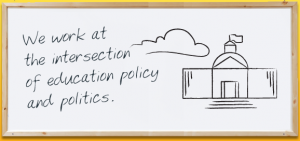 Back in August President Obama gave a speech about education policy at Canyon Springs High School in Las Vegas. Here’s a snippet posted in a blog piece…
Back in August President Obama gave a speech about education policy at Canyon Springs High School in Las Vegas. Here’s a snippet posted in a blog piece…
Education should not be a Democratic or a Republican issue. It’s an American issue. It’s about what’s best for our kids. And I haven’t just talked the talk, I’ve walked the walk on this. Over the past four years, we’ve broken through the traditional stalemate that used to exist between the left and the right, between conservatives and liberals. We launched a national competition to improve all our schools. We put more money into it, but we also demanded reform. We want teachers to be paid better and treated like the professionals that they are. But we’re also demanding more accountability, including the ability of school districts to replace teachers that aren’t cutting it.
If you unpack this paragraph from his speech there is so much context underneath that bears further discussion and much of which I find particularly frustrating.
First of all, why shouldn’t education be a political issue? Isn’t the whole point of having a democracy to use it to bring a range of thinking to the table and continually find an ever-evolving consensus (or at least a working majority) to evolve our society and its institutions? What if he said, “Economic policy should not be a political issue, it’s about what’s best for the country”, would people accept that as well? Taking this argument to its logical end point, why have a political process at all?
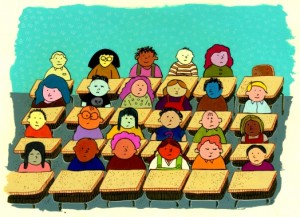 So I was in the mood for a rant today… You’ve been warned…
So I was in the mood for a rant today… You’ve been warned…
Based on all my life’s experience, all the principles I hold dear, and all my study of human history and development, I am fundamentally opposed to having a standardized education imposed on young people by the government. It is the most effective tool of the totalitarian state, and all the more pernicious when wielded by the highest levels of government in a democratic society. I fear that it will continue to erode the underpinnings of the democratic principles the United States was founded on, continuing to teach each successive generation that the powers that be know best and you better get used to that if you want to succeed in life.
 As a progressive, I continue to be frustrated with the ideological split in our country’s governing bodies that seems to be preventing them from addressing key issues that will help us move forward as a society. But as not a particularly partisan one, I always try to appreciate the positions and underlying world view of more conservative comrades on the other side of our current dysfunctional divide.
As a progressive, I continue to be frustrated with the ideological split in our country’s governing bodies that seems to be preventing them from addressing key issues that will help us move forward as a society. But as not a particularly partisan one, I always try to appreciate the positions and underlying world view of more conservative comrades on the other side of our current dysfunctional divide.
So trying to get beyond all this pitched political conflict that has lead to a paralysis of pragmatism (how Spiro Agnew, if you even remember that far back!), I am trying to synthesize something, using components from both sides, that could be a practical path forward. My thinking at the moment revolves around some sort of synergy of entrepreneurship with a strong “commons”. We can continue to be an innovative risk-taking society, but with an overarching belief, as Bill Clinton so eloquently pointed out in his Democratic convention speech, that we are all in this together, rather than “You’re on your own”. The latter I fear will lead to all sorts of bad stuff like competition within a world view of scarcity, economic winners and losers, one dollar (rather than one person) one vote, and increased “us and them” thinking. Continue reading →
 I recently finished reading the book Constantine’s Sword – The Church and the Jews, laying out the historical account of Christian antisemitism and how that seeded a ground of separation and hate that made the Holocaust possible, if not inevitable. The author, James Carroll, is a liberal Catholic theologian who feels that his Church has to fully acknowledge its culpability and atone for its sins for the institution to continue as a vibrant faith community into the 21st century. With a good narrative style that weaves together the key events in history along with his own life’s story visiting the sites of much of that history, Carroll makes a compelling case for his religion to transform itself, simply stated, from an authoritarian to a more egalitarian institution. Some scholarly critics ding his book for relying on mostly secondary sources, sources that perhaps spin the history which Carroll then spins ever further, but his interpretation of that history certainly feeds in with my own.
I recently finished reading the book Constantine’s Sword – The Church and the Jews, laying out the historical account of Christian antisemitism and how that seeded a ground of separation and hate that made the Holocaust possible, if not inevitable. The author, James Carroll, is a liberal Catholic theologian who feels that his Church has to fully acknowledge its culpability and atone for its sins for the institution to continue as a vibrant faith community into the 21st century. With a good narrative style that weaves together the key events in history along with his own life’s story visiting the sites of much of that history, Carroll makes a compelling case for his religion to transform itself, simply stated, from an authoritarian to a more egalitarian institution. Some scholarly critics ding his book for relying on mostly secondary sources, sources that perhaps spin the history which Carroll then spins ever further, but his interpretation of that history certainly feeds in with my own.
His book nicely ties in with my own study of history and human civilization’s gradual transition from hierarchies of control (empires, slavery, monarchies, feudalism, etc) toward circles of equals (republics, democracy, universal human rights, etc). But in particular, it reinforces my contention, laid out in a previous piece, that religious belief and practice is not the source of hatred, violence and war, but religion as an institution has been hijacked by an older more sinister dogma of patriarchy, that torques it into an instrument of domination and control, leading to that hatred, violence and war.
I am neither Jew nor Christian, nor believer in any deity. But as a student of history and the continuing story of human development, one cannot fully understand that history and that story without factoring in spiritual beliefs and practices, and the institutionalized religions that grow out of them. And particularly for those of us who champion the cause of progressivism, democracy, pluralism and the inherent worth and dignity of every individual, I think it is critical to realize what we are really fighting against. Not people’s attempts to find a deeper spiritual meaning in their lives through religious practice, but instead an ancient paternalistic order, perpetuated through the millennia, that promotes a world view of fear, scarcity and “us and them” thinking that invariably leads to hate, violence and coercive control.
Please note, that like the author Carroll, it is not my goal to dis the Catholic Church or its hierarchy as some sort of conspiracy theory bogeyman for all the ills of society, though I’m concerned some may take my piece that way. But the authority wielded by a Church hierarchy as witnessed and documented by Carroll that has maintained itself consistently over 1500 years is a notable instance of a “successful” patriarchal institution that continues to perpetuate itself from generation to generation. There are many other ways that the patriarchal “who’s your daddy?” world view propagates itself, but this perhaps is an instance that is most straightforward and easily recognized.
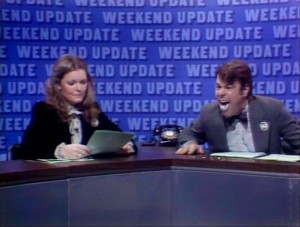 Confessing my own bias as a big supporter of unschooling, I read Dennis Danziger’s piece, “Home School Fever”, in the April 24 edition of the Huffington Post, and it seemed to push more buttons in me than I even knew I had! I recall that classic Saturday Night Live “Weekend Edition” bit where Jane Curtin and Dan Aykroyd do a “Point-Counterpoint”, and after Curtin dresses down Aykroyd in every possible way he grits his teeth and responds, “Jane, you ignorant slut!” Not sure if Danziger is playing the Curtin or the Aykroyd part in this encounter, but grrrr!
Confessing my own bias as a big supporter of unschooling, I read Dennis Danziger’s piece, “Home School Fever”, in the April 24 edition of the Huffington Post, and it seemed to push more buttons in me than I even knew I had! I recall that classic Saturday Night Live “Weekend Edition” bit where Jane Curtin and Dan Aykroyd do a “Point-Counterpoint”, and after Curtin dresses down Aykroyd in every possible way he grits his teeth and responds, “Jane, you ignorant slut!” Not sure if Danziger is playing the Curtin or the Aykroyd part in this encounter, but grrrr!
I know the Post has a wonderful contributor, Peter Gray, who is an eloquent homeschool/unschool advocate (and just had that great interview with unschooler Kate Fridkis published in Psychology Today). So if the Post is trying to provide “both sides” of the homeschooling issue, they sure picked an uniformed, unthoughtful spokesperson for conventional public “schooling”. My initial reaction is that it rises to the level of hate speech, but that may be my buttons talking.
So I’m trying to parse his bilious words while re-initializing this previously unrevealed array of triggers in my psyche that he so expertly managed to activate with a mere 514 word rant. Certainly for sheer “button per word” efficiency, Danziger must be up there with the best of show. (Take a deep breath Coop… exhale… once more… okay?… yes… good… let’s proceed.)